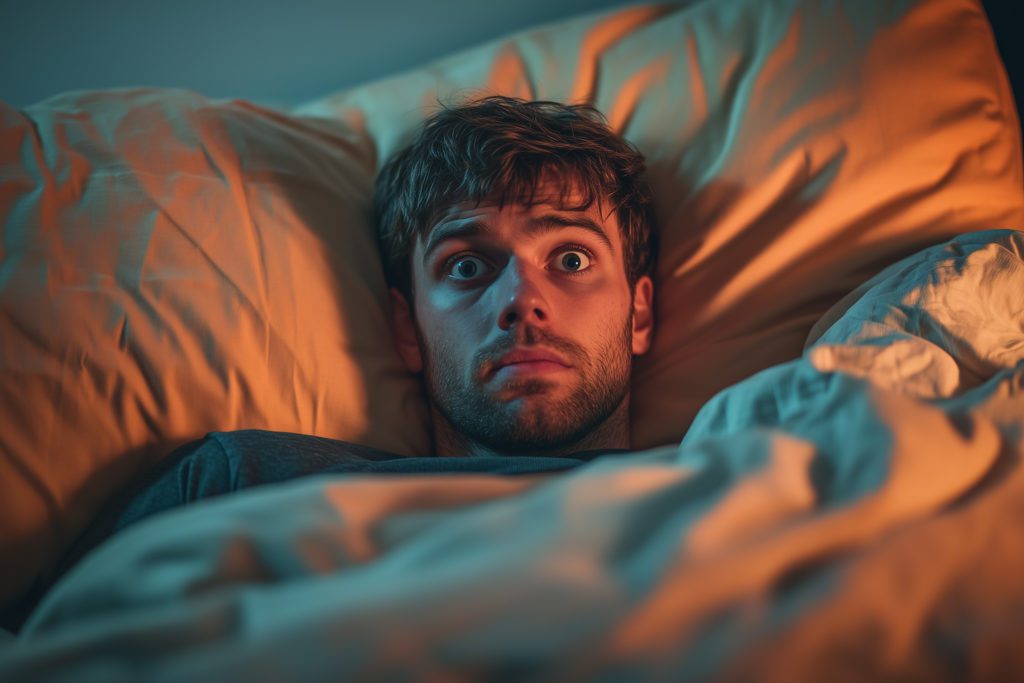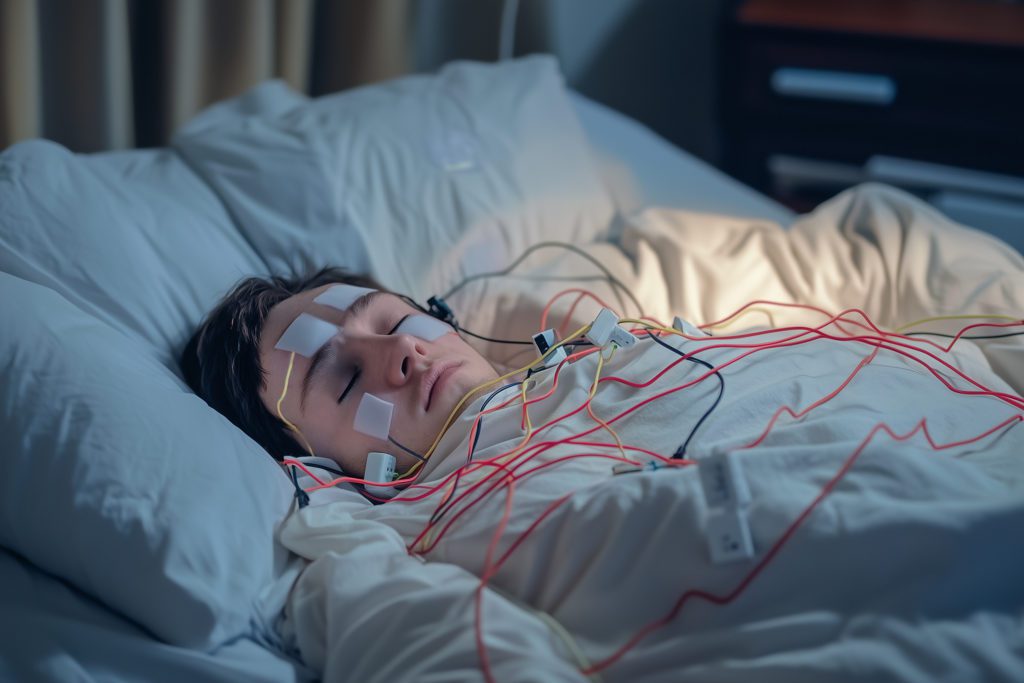
Sleep Disorders Associated with Excessive Sweating at Night
Sleep disorders that activate your fight or flight response can cause excessive sweating. Learn what sleep disorders can cause excessive sweating and how to find relief.

Do you wake up in the morning covered in sweat? The most obvious reason for your night sweats is that your room is too hot, but if you’re shivering as you go to bed because of how low the thermostat is and still wake up sweating, it’s time to look elsewhere for a cause.
Certain sleep disorders can cause excessive sweating at night, meaning they not only interrupt your sleep (and make your sleep poor quality) but also leave you in desperate need of a shower when you wake up.
Let’s explore the sleep disorders that can cause excessive sweating at night, other potential causes of your sweating, and how you can manage it.
What Sleep Disorders Cause Excessive Sweating at Night?
Sleep disorders that cause an overactive sympathetic nervous system, which is responsible for your “fight or flight” mode, may be behind your nighttime sweating.
Your sympathetic nervous system bumps up your heart rate, speeds up your breathing, and releases acetylcholine. This neurotransmitter is responsible for many things, one of which is the secretion of sweat. So, your sweating isn’t always because your body is too hot; sometimes, it’s because your nervous system has been stimulated, which is how sleep disorders can come into play.
Obstructive Sleep Apnea
Around half of those with obstructive sleep apnea, a sleep disorder characterized by episodes of stopped breathing, experience nighttime sweating, specifically around the neck and upper body.
A likely connection between obstructive sleep apnea and sweating is the increase in blood pressure that occurs when you don’t breathe in enough oxygen (because your airways are obstructed). High blood pressure can activate the sympathetic nervous system, then leading to sweating.
For those with obstructive sleep apnea, research has found that treating the sleep disorder with a CPAP machine may resolve your nighttime sweating.
Insomnia
If you have trouble falling asleep, staying asleep, or having good quality sleep, you may have insomnia. It’s the most common sleep disorder and has been linked to high blood pressure, which may be how it is connected to nighttime sweating.
Insomnia may also result from nighttime sweating. For instance, if you cannot get comfortable because you’re sweating and feel too hot, you may not be able to sleep.
Restless Leg Syndrome
Studies into restless leg syndrome (RLS), a sleep disorder causing a strong urge to move the legs, have shown that it is increasingly prevalent in those who have night sweats. The periodic limb movements have been associated with large increases in heart rate and blood pressure, which can then activate the sympathetic nervous system.
Conversely, night sweating may be what contributes to restless leg syndrome, with those affected unable to get comfortable because of their internal temperature.
Narcolepsy
Narcolepsy, which causes periods of intense drowsiness during the day, can affect the autonomic nervous system, which includes the sympathetic nervous system discussed before (your “fight or flight” response). This autonomic dysfunction can cause symptoms such as fainting spells, erectile dysfunction, low body temperature, low blood pressure, heart palpitations, and night sweats.
Other Causes of Night Sweats
Night sweats are not always indicative of a sleep disorder. In fact, there are many different reasons why you may wake up covered in sweat that have nothing to do with your sleep.
If you’re sick and have a fever working to fight the infection, the elevated body temperature can cause excessive sweating.
Yet another possibility, specifically in women, is hormonal changes thanks to premenstrual syndrome (PMS), pregnancy, and menopause. Nighttime sweating can often accompany other symptoms of these times because of the decline in estrogen.
Men aren’t immune to nighttime sweating from hormonal changes, either, with low testosterone capable of causing it as well.
Those with neurological conditions, such as Parkinson’s disease, stroke, or spinal cord injuries, can also experience night sweats, as can those with diabetes when they have low blood sugar.
In some cases, the night sweats may be a side effect of your medication, with antidepressants, methadone, and hormonal medications common culprits.
Night sweats may also be due to a mental health condition, such as anxiety or post-traumatic stress disorder (PTSD).
In essence, many things may be causing your excessive sweating at night, with sleep disorders being only one possibility. The best thing you can do for your health is to take notice of your other symptoms and speak to your doctor. They can order tests, as needed, to help determine what is causing your night sweats.
How to Stop Night Sweats and Sleep Better
If your night sweats are due to a sleep disorder, treating the sleep disorder is the best way to lessen the likelihood of night sweats. Reaching out to a doctor can help you determine if your night sweats are from a sleep disorder and which treatment path is best for you.
Besides seeking medical attention, if there is a need, there are other ways to reduce the likelihood of night sweats that focus on improving your sleep environment and hygiene, such as:
- Replacing your old mattress with a cooling mattress to prevent heat retention
- Turning down the thermostat
- Investing in lightweight, breathable bedsheets
- Wearing lightweight and loose-fitting pajamas
- Trying relaxation techniques before bed to reduce stress and improve sleep
- Avoiding alcohol, caffeine, and spicy foods
Are Night Sweats a Sign of a Sleep Disorder?
While many sleep disorders can cause night sweats by activating the “fight or flight” aspect of your nervous system, including obstructive sleep apnea, insomnia, restless leg syndrome, and narcolepsy, there are also a myriad of other causes. Everything from sleep environment to medical conditions to hormonal effects can cause night sweats, making it hard to determine their cause by the sweating alone.
If you’re experiencing excessive sweating at night, and it doesn’t improve by dropping your thermostat, using a fan, and opting for thinner pajamas, it’s often best to talk to your doctor about what may be causing it based on other symptoms you have. Then, you can find relief and save the sweat for summer days and exercise sessions.

Written by
Jessica G.
Medical writer freelancer who has written hundreds of articles on varying topics. Masters of Engineering degree in Biomedical Engineering.
Download Pillow
Get help
Press & News
Legal
Connect
X (Twitter)
Company
Copyright © Neybox Digital Ltd.



